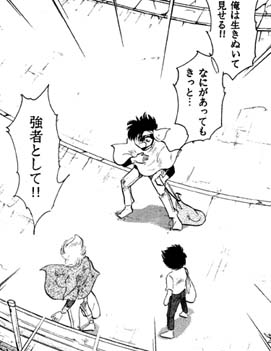![]()
The following comes from an article which was posted on a magazine. It might help you get the idea what Shinku-chitai is like, soI put it here.
Shinku-Chitai (The Vacuum Zone), it seems to mean ga hardly survival landh. The protagonists of this story are Tetsu who leads a children group, and Kaoru who is a maverick individual. The story of chapter one consistently shows a gsurvival story of childrenh.
What the author describes are gimpulseh to life (survival). It seems
more flaming than "obsession" or "instinct "as we say.
It might be a major shock to someone who wants to make some senses out
of it gWhat for?h (like me) or who easily think about gdeathh as one
of the alternatives when he faces with difficulty.
 Do everything to live. Eat things you hate. Sell your body. Attack others.
The people who canft do, they choose death. The children force to face
that many grown-ups fall into the situation and give up. The only character
who really want to survive can gather the threads of the story. Tetsu cries,
gI do survive! I'll be a survivor, at any cost ... AS THE STRONG!h Even
if it means that he clings desperately to a false purpose and responsibility.
Do everything to live. Eat things you hate. Sell your body. Attack others.
The people who canft do, they choose death. The children force to face
that many grown-ups fall into the situation and give up. The only character
who really want to survive can gather the threads of the story. Tetsu cries,
gI do survive! I'll be a survivor, at any cost ... AS THE STRONG!h Even
if it means that he clings desperately to a false purpose and responsibility.
The chapter one shows childrenfs survival life. In the chapter 2, the
people began to bring order to chaos, and they have the option of helping
each other to live. Then, in the chapter 3, glovesh are described at
last, and the relationship is revealed which between gisolated zoneh
and outside.
I think this work is an elaboration; it descries human behavior of the
people close by death. The author tries to watch over both death and live
as they are without whitewashes. In such a story, whatfs kind of ending
is possible? I, in personally, prefer the beautiful things which come from
ugly things . It makes my expectation of this story increase. I canft
take my eyes off.
Yuko Fujimoto Tokyo/Japan
Original is in Japanese